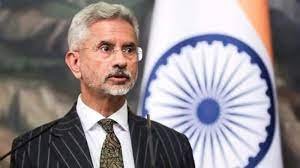Russia President Vladimir Putin, who hosted India’s Foreign Minister on Wednesday, December 27, stated that despite the current unrest, ties between the two nations are improving.
The five-day visit from December 25–29 included a meeting with Subrahmanyam Jaishankar. Putin began the discussion by promising to update the Indian envoy on the conflict in Ukraine, over which Indian Prime Minister Narendra Modi has taken a neutral stand.
Key Highlights of the Russia Tour
Putin stated, “I am aware of his determination to use all available options to find a peaceful solution to this issue.”
As Western sanctions limit oil shipments, India is becoming a more significant market for Russia’s oil exports, which are the foundation of its economy.

Encouraging more sustainable economic interactions is crucial. We must consider how to make this happen,” Jaishankar stated.
“It is critical that we increase the sustainability of our commercial interactions. According to a Kremlin summary of the meeting’s beginning, Jaishankar stated, “We need to think about how to achieve this.”
Jaishankar also held talks with Deputy PM and Trade Minister Denis Manturov to discuss ways to enhance and grow economic engagement between both nations. The agreement to host an early meeting of the EaEU-India FTA negotiations was reached after the two parties concluded their cooperation program in the Far East. Additionally, India drew attention to the disparity in bilateral trade.
During their meeting, Sergey Lavrov, Jaishankar’s colleague, reported that they talked about “the prospects for military-technical cooperation, including the joint production of modern types of weapons.”
India’s foreign minister praised the “all-time high” commercial turnover of $50 billion or more between the two nations in 2022.

To continue working together on future units of the Kudankulam nuclear power project, two significant revisions were made. By doing this, Russian support for the fifth and sixth reactors is guaranteed. India currently has agreements for civil nuclear cooperation with the US and France, but only Russia is building atomic reactors there.
According to Lavrov, this is how Russia can help India with its efforts to meet its needs for secure and sustainable energy. Additionally, the nation has expressed interest in creating cooperatively floating nuclear power units. Russia has a wealth of expertise in this area. These might be useful for supplying Indian islands with electricity.
S. Jaishankar and Russian FM Sergey Lavrov signed a protocol for consultation for the period 2024–28. With Lavrov, he discussed global and regional issues ranging from the war with Ukraine to the Israel-Hamas war. Both held the press conference, addressing the citizens and cherishing the partnership between both nations.
S. Jaishakar had a round-table meeting with Russian experts and academic experts. He paid homage to the statue of Bapu. Later, he had a heartfelt interaction with the Indian community in Moscow.
In St. Petersberg, Jaishankar met with university students and indologists at St. Petersberg State University.
The topic of connectedness as a means of promoting trade was thoroughly examined, encompassing the Northern Polar Route, the Chennai-Vladivostok Maritime Corridor, and the International North-South Transport Corridor (INSTC).

Operationalization of the INSTC and Chennai-Vladivostok Economic Corridor has become crucial given the challenges encountered in the development of the India-Middle East Economic Corridor. India is likewise considering using the Polar Route for commerce. According to Jaishankar, connectivity activities are co-organized by Russia and India over land and sea channels.
We’re hoping to surpass that this year. Furthermore, the speaker stated that this commerce must offer equitable market access, be sustainable, and be more balanced.
The visit to Russia by Jaishankar depicts the valued and steady partnership between both nations.












